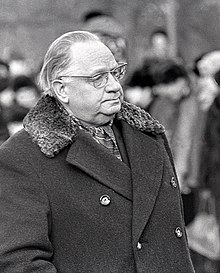Johannes Käbin
You can help expand this article with text translated from the corresponding article in Estonian. (December 2013) Click [show] for important translation instructions.
|

Johannes Käbin (Russian: Йоха́ннес Кэ́бин), also known by his Russified name Ivan Gustavovich Kebin[1] (Russian: Иван Густавович Кэбин; 24 September 1905 – 25 October 1999), was an Estonian Soviet politician who led the Communist Party of Estonia from 1950 to 1978.[2] Käbin was an ethnic Estonian but had been raised in Russia (so-called "Yestonian"), as his family had moved to Saint Petersburg in 1910. After Estonia regained its independence until his death, Käbin was a member of the Social Democratic Labour Party.
Biography
Johannes Käbin was born in 1905 in Kalvi, Virumaa. In 1907, Käbin's family moved from Estonia to St. Petersburg, where his father died in the same year. In 1916, together with his mother and older sister, he moved to the village of Sussanino in Petrograd Province, where the family bought a small farm (0.27 hectares). In 1926 he entered the Leningrad School of Soviet and Party Construction. A year later, Käbin was appointed chairman of the Susanin Village Council of the Gatchina (Trotsky) district. He completed his studies from Institute of Red Professors in 1938.
Career
He worked as a teacher in Moscow before returning to Estonia after the Second World War.[3] Käbin later became the Deputy Head of the Propaganda and Agitation Department of the Central Committee of the EKP. In 1948, Käbin returned to be elected secretary of the Central Committee for Propaganda and Propaganda. In 1950, at the 8th Plenum, he was elected as First Secretary of the EKP. Initially a hardline Stalinist, he gradually became more moderate in the post-Stalin era but nevertheless remained devoted to the consolidation of Soviet rule in Estonia. He was in this position for more than 25 years, in part due the Kremlin's approval of his policies.[4] He was the Chairman of the Supreme Soviet (head of state) from 1978 to 1983.
Later life
After the restoration of independence, he remained in Estonia. He died in Tallinn in 1999 at the age of 94. He is buried in Metsakalmistu.
Personal life
His son is the physicist Eduard Käbin (born 17 April 1945), who is a graduate of Moscow State University and is a Honorary Worker of Higher Professional Education of Russia.[5]
Awards
He received many awards, such as the:
- Hero of Socialist Labour (1975)
- Six Orders of Lenin (1950, 1955, 1958, 1965, 1971, 1975)
- Order of the October Revolution (1973)
- Two Orders of the Red Banner of Labour (1946, 1981)
- Order of Friendship of Peoples (1985)
- Medal "For Labour Valour" (1959)
References
- ^ "КЭБИН ИВАН ГУСТАВОВИЧ - Визуальный словарь". vslovar.ru. Retrieved 2021-07-10.
- ^ OKIA. "Nõnda arvas Käbin …". Sirp (in Estonian). Retrieved 2021-07-10.
- ^ "Кэбин Иван Густавович". www.warheroes.ru. Retrieved 2020-12-21.
- ^ ERR, Tõnu Tannberg, ajaloolane, Teaduste Akadeemia liige | (2020-05-14). "Tõnu Tannberg: Käbin püsis pikalt võimul tänu heale läbisaamisele Moskvaga". ERR (in Estonian). Retrieved 2021-07-10.
{{cite web}}: CS1 maint: multiple names: authors list (link) - ^ "Кэбин Эдуард Иоханнесович". nuclphys.sinp.msu.ru. Retrieved 2021-07-10.
- 1905 births
- 1999 deaths
- People from Viru-Nigula Parish
- People from Kreis Wierland
- Heads of the Communist Party of Estonia
- Heads of state of the Estonian Soviet Socialist Republic
- Estonian communists
- Members of the Central Committee of the 19th Congress of the Communist Party of the Soviet Union
- Members of the Central Committee of the 20th Congress of the Communist Party of the Soviet Union
- Members of the Central Committee of the 22nd Congress of the Communist Party of the Soviet Union
- Members of the Central Committee of the 23rd Congress of the Communist Party of the Soviet Union
- Members of the Central Committee of the 24th Congress of the Communist Party of the Soviet Union
- Members of the Central Committee of the 25th Congress of the Communist Party of the Soviet Union
- Members of the Central Committee of the 26th Congress of the Communist Party of the Soviet Union
- Members of the Supreme Soviet of the Estonian Soviet Socialist Republic, 1951–1955
- Members of the Supreme Soviet of the Estonian Soviet Socialist Republic, 1955–1959
- Members of the Supreme Soviet of the Estonian Soviet Socialist Republic, 1959–1963
- Members of the Supreme Soviet of the Estonian Soviet Socialist Republic, 1963–1967
- Members of the Supreme Soviet of the Estonian Soviet Socialist Republic, 1967–1971
- Members of the Supreme Soviet of the Estonian Soviet Socialist Republic, 1971–1975
- Members of the Supreme Soviet of the Estonian Soviet Socialist Republic, 1975–1980
- Members of the Supreme Soviet of the Estonian Soviet Socialist Republic, 1980–1985
- Third convocation members of the Soviet of Nationalities
- Fourth convocation members of the Soviet of the Union
- Fifth convocation members of the Soviet of the Union
- Sixth convocation members of the Soviet of the Union
- Seventh convocation members of the Soviet of the Union
- Eighth convocation members of the Soviet of Nationalities
- Ninth convocation members of the Soviet of Nationalities
- Tenth convocation members of the Soviet of Nationalities
- Institute of Red Professors alumni
- Heroes of Socialist Labour
- Recipients of the Order of Friendship of Peoples
- Recipients of the Order of Lenin
- Recipients of the Order of the Red Banner of Labour
- Burials at Metsakalmistu
